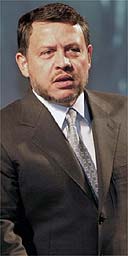Jordan today offered to host talks between warring Palestinian factions after a resumption of major violence around Gaza City killed four people and injured almost 20 others, including a group of schoolchildren caught in crossfire.
The fresh battles between forces loyal to the Fatah and Hamas groups came a day after Tony Blair held discussions in the West Bank town of Ramallah with the Palestinian president, Mahmoud Abbas.
Meanwhile, Jordan's King Abdullah II has said he is prepared to host discussions between leaders of Fatah and Hamas. His offer came after the Israeli prime minister Ehud Olmert made a surprise visit to the monarch for talks on reviving the Israeli-Palestinian peace process.
"Jordan is willing to do all it can to help the Palestinians overcome their differences and to bolster Palestinian unity," a statement from the royal palace said. It added that "all options are open", including a meeting in Amman between the Fatah leader, Mr Abbas, and the Palestinian prime minister, Ismail Haniyeh, of Hamas.
The worst factional fighting between Palestinian groups in a decade, which killed three people at the weekend, eased slightly during Mr Blair's visit after Fatah and Hamas leaders agreed a ceasefire.
However, a gun fight began early today when Hamas militiamen guarding a Gaza hospital blocked the entry of two armed Fatah members accompanying an injured colleague.
The fighting escalated, killing four people and injuring 18 more, including five schoolchildren hit by stray gunfire. Masked Hamas gunmen set up makeshift checkpoints on main roads while a Fatah security installation was attacked with mortar fire.
The groups have been locked in a power struggle since the more radical Hamas won legislative elections in January. Fatah, which seeks peace with Israel, controls the presidency, while the radical Hamas, which is committed to Israel's destruction, controls parliament and the cabinet.
Tensions have escalated since efforts to form a moderate unity government collapsed in late November.
At the weekend, Mr Abbas announced plans for early elections as a way to end the deadlock, something Hamas condemned as an effective coup.
Mr Blair yesterday proposed a plan to bolster the beleaguered Palestinian president by funnelling millions of pounds in aid directly to security forces under the Palestinian leader's control.
Mr Blair laid out his plan following the meeting with Mr Abbas, where he promised he "would not rest for a single moment" until a two-state solution was secured.
Mr Blair's office said the funding plan would require some new mechanism to ensure that the money, predominantly EU aid, was spent on agreed programmes and did not fund Fatah party militias or corruption.
The EU blocked aid to the Palestinian Authority following the election of Hamas, which it considers a terrorist group.
Mr Blair, who also held talks yesterday with Mr Olmert, arrived in Abu Dhabi today for the final leg of a week-long Middle East tour.
The current tour has been billed as Mr Blair's final push for Middle East peace before his likely departure from Downing Street next year. However, his official spokesman said today the prime minister did not rule out a return visit.
"This is very much part of an ongoing process which he will build on in the new year," said the spokesman.
"Nobody underestimates the difficulties, but there is an effort going on to understand the position of the other side which is qualitatively different from before."
During his first ever visit to the United Arab Emirates, Mr Blair is set to meet the state's president, Sheikh Khalifa bin Zayed, as well as the prime minister, Sheikh Mohammed bin Rashid, the ruler of Dubai and a member of the wealthy Maktoum family who are bidding to buy Liverpool football club.
Addressing students at a women-only university in Abu Dhabi today, Mr Blair said the most important challenge for the modern world was to create a "global culture" based on universal values of openness, tolerance and justice.
Despite their different religions and different cultures people of moderation around the world "share the same god and the same values", he said.
